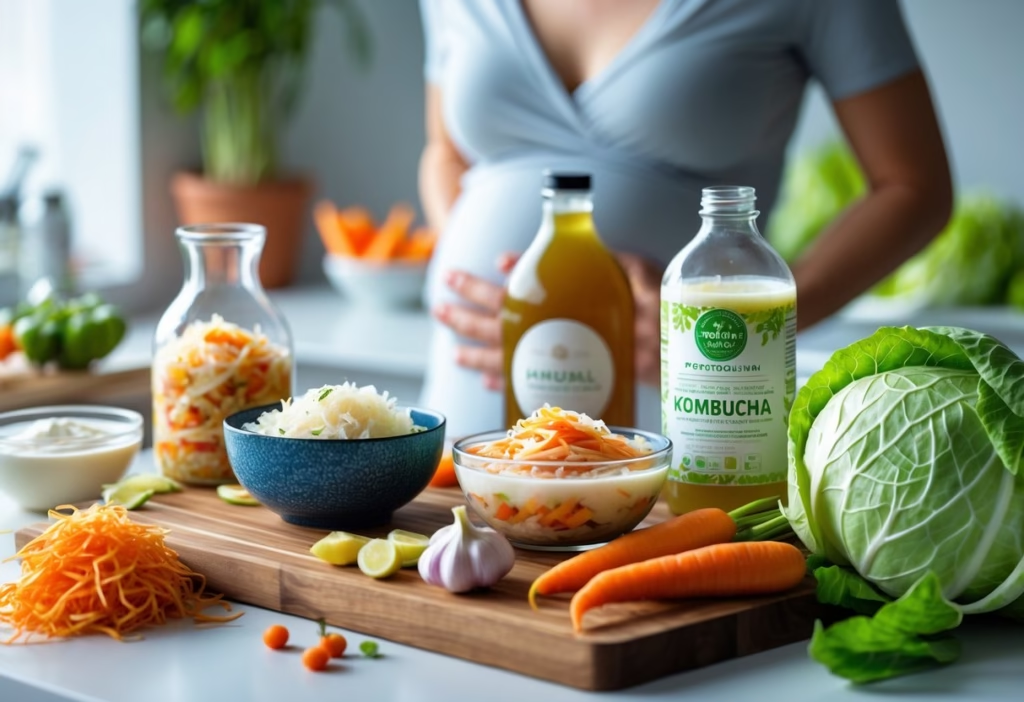Your morning kombucha might be doing wonders for your gut, but have you ever wondered if it’s also changing your digestive odor? Fermented foods can both help and hinder digestive odor depending on the type consumed, individual gut bacteria, and how these foods interact with your unique microbiome.

Some fermented foods promote beneficial bacteria that reduce unpleasant digestive smells. Others might temporarily ramp up gas production or even make odor worse for some folks.
The relationship between fermented foods and digestive odor is honestly pretty tangled. These foods bring live bacteria into your system, shifting the balance of your gut microbes in ways that can improve—or sometimes worsen—digestive symptoms.
Factors like the specific bacterial strains, how the food’s processed, and your own tolerance all matter. There’s no one-size-fits-all answer here.
Understanding how different fermented foods actually affect you means digging into both the science of fermentation and your personal digestive quirks. Not all fermented foods are created equal when it comes to gut health benefits, and some can cause more digestive drama than others.
It really comes down to figuring out which ones mesh with your system and how to fit them into your meals without regrets later.
Understanding Fermented Foods and the Fermentation Process
Fermentation transforms regular foods through controlled microbial activity. This process creates products with unique flavors, textures, and boosted nutrition.
It’s an age-old way of preserving stuff, and it relies on certain microorganisms—lactic acid bacteria, yeasts, sometimes even molds—to break down sugars and churn out beneficial compounds.
What Are Fermented Foods?
Fermented foods are made when microorganisms like bacteria, yeasts, or molds convert carbohydrates into alcohol, acids, and gases. This not only preserves the food but also totally changes its taste and texture.
You’ll find yogurt, kefir, sauerkraut, kimchi, kombucha, and sourdough bread on the list of usual suspects. Each one’s got live cultures that stick around for you to eat.
The fermentation process can ramp up vitamin levels and make minerals easier to absorb. Complex compounds get broken down into simpler, more digestible bits, which is honestly pretty cool.
Dairy ferments like yogurt are full of Lactobacillus and Bifidobacterium. Vegetable ferments—think sauerkraut—depend on microbes hanging out on the veggies themselves.
The Science Behind Fermentation
Fermentation’s a natural process where bacteria and yeast break down sugars when there’s no oxygen around. The result? Organic acids, enzymes, and a bunch of other useful stuff.
It starts when the microbes munch on sugars in the food. Depending on who’s doing the fermenting, you get lactic acid, acetic acid, or alcohol as byproducts.
These acids make the food more acidic, which keeps bad bacteria at bay. That tangy, sharp flavor? Yep, it’s from the acids, too.
Key biochemical changes include:
- Sugar conversion to organic acids
- Protein breakdown into amino acids
- Enhanced enzyme production
- Vitamin synthesis (especially B vitamins)
Temperature and salt levels control which microbes get to party. Cooler temps slow things down, which can be good if you’re aiming for a more mellow ferment.
Key Microorganisms in Fermented Foods
Lactic acid bacteria (LAB) are the MVPs of fermentation, but there are plenty of other microbes in the mix that shape safety, nutrition, and flavor. LABs dominate veggie and dairy ferments for the most part.
Primary fermentation microorganisms include:
- Lactobacillus species (yogurt, sauerkraut, sourdough)
- Bifidobacterium strains (kefir, fermented dairy)
- Saccharomyces yeasts (kombucha, kefir grains)
- Acetobacter bacteria (vinegar, kombucha)
Kombucha’s got its own thing going on—a SCOBY (Symbiotic Culture of Bacteria and Yeast). This living blob is a whole ecosystem, fermenting sweet tea into something fizzy and tart.
Different foods need different microbes. Milk ferments need lactose-digesters, while veggie ferments rely on bacteria that can handle plant sugars and starches.
The final taste, texture, and nutrition of the food all depend on this microbial balancing act. It’s a bit of an art, honestly.
Digestive Odor: Causes and Connections to Gut Health

Digestive odor is a weirdly personal thing. It comes from a mashup of gut bacteria, how your body breaks down food, and all the gases produced along the way.
Your gut microbiome is a key player here. The foods you eat, your own digestive patterns, and the bacteria living in your gut all mix together to create a unique, sometimes pungent, signature.
How the Gut Microbiome Influences Odor
There are trillions of bacteria in your gut, and they’re busy breaking down food particles through fermentation. As they do their thing, they release gases like hydrogen sulfide, methane, and ammonia.
Sulfur-producing bacteria are the main culprits for the worst smells. Bacteria like Desulfovibrio and Bilophila crank out hydrogen sulfide when they get hold of sulfur-rich foods.
If your gut bacteria are nicely balanced, you probably don’t notice much odor. But if things get out of whack, you might end up with more “noticeable” digestive moments.
Different bacteria make different smells:
- Proteolytic bacteria break down proteins, creating that ammonia funk
- Saccharolytic bacteria ferment carbs, usually making less offensive gases
- Sulfate-reducing bacteria are responsible for that rotten egg stench
Ever been on antibiotics and noticed a change? That’s because antibiotics shake up your gut bacteria, sometimes making things smellier until balance returns. It’s not just you.
Common Triggers of Digestive Odor
Lots of things can fire up digestive odors. Food intolerances top the list—when you can’t break down something, bacteria get a free-for-all and the results can be…memorable.
Lactose intolerance means undigested lactose hits your colon, where bacteria ferment it, causing gas and strong odors. It’s not fun, but it’s common.
Small intestinal bacterial overgrowth (SIBO) is another troublemaker. When bacteria hang out where they shouldn’t, fermentation goes into overdrive and gas gets way worse. If you’ve ever wondered why things smell extra strong, this could be a reason.
Constipation is sneaky—it lets food sit around longer, giving bacteria more time to break things down and make odors even more intense.
Some medical conditions can mess with odor too:
- Inflammatory bowel disease changes your gut bacteria mix
- Celiac disease hurts your gut lining and digestion
- Gastroparesis slows everything down, so food ferments longer
Stress isn’t just in your head. It can slow or speed up digestion and change your gut bacteria, sometimes making things smellier than usual. Weird, right?
The Role of Diet in Digestive Smells
What you eat really does show up in your digestive odor. Some foods are just loaded with sulfur or other compounds that bacteria love to turn into gas.
High-sulfur foods are the usual suspects:
- Broccoli, cabbage, and other cruciferous veggies
- Eggs and dairy
- Garlic, onions
- Red and processed meats
Fermentable carbs—like those in beans or certain fruits—feed gut bacteria and can increase gas. Foods high in FODMAPs (fermentable oligosaccharides, disaccharides, monosaccharides, and polyols) are especially active in this department.
Fiber’s a double-edged sword. It’s great for gut health, but if you suddenly eat a lot more, your bacteria need time to adjust, and you might notice extra gas for a bit.
Protein-heavy diets tend to make digestive odors worse, since breaking down protein creates more ammonia and sulfur compounds than carbs do.
How you cook matters, too. Raw foods often need more bacterial help to digest, which can lead to more gas (and more odor) than cooked foods. Go figure.
Fermented Foods: Benefits for Digestive Health and Odor
Fermented foods aren’t just tasty—they bring live microbes that can seriously help your gut and even cut down on digestive odors. They boost microbial diversity, offer digestive enzymes, and can calm inflammation for better overall digestion.

Probiotics and Beneficial Bacteria
Fermented foods are natural sources of probiotics—good bacteria that mostly live in your gut. These live cultures help restore balance to your microbiome (and honestly, who doesn’t want that?).
Lactobacillus and Bifidobacterium are the probiotic all-stars. Lactobacillus pops up in yogurt, sauerkraut, and kimchi, while Bifidobacterium is big in fermented dairy.
These helpful bacteria crowd out the “bad” guys that can cause foul-smelling gas. By making your gut a little more acidic, they keep the nastier bacteria from taking over.
If you eat probiotic-rich foods on the regular, you’re more likely to have a balanced gut. That means fewer sulfur compounds and less of those eye-watering digestive odors. At least, that’s the hope.
Enhancing Microbial Diversity
A diverse gut microbiome is a game changer for reducing digestive odors and keeping your gut in good shape. Fermented foods help replenish beneficial microbes that are often wiped out by modern processed diets.
Different fermented foods—think kimchi, yogurt, kombucha—each bring their own mix of bacterial strains. This variety builds a more resilient digestive ecosystem, and honestly, who doesn’t want a stronger gut?
When your gut is home to a wide range of microbes, food breaks down more efficiently. That means fewer undigested leftovers hanging around to ferment and cause those not-so-pleasant smells.
Key benefits of microbial diversity:
- Improved food breakdown
- Reduced gas production
- Better nutrient processing
- Stronger gut barrier function
The gut barrier tends to get stronger when different bacteria work together. This teamwork helps block toxins and undigested food from causing inflammation and those dreaded odors.
Enzymes and Nutrient Absorption
Fermented foods are loaded with digestive enzymes that help break down proteins, fats, and carbs. These enzymes lighten the load on your digestive system and help your body soak up more nutrients.
Take lactase in fermented dairy, for example—it makes milk sugars easier to digest. That’s a big deal for folks who get gassy or bloated from regular milk.
The fermentation process also ramps up the bioavailability of certain nutrients. B vitamins (especially B12) are more accessible, and minerals like calcium and magnesium get easier for your body to grab.
When your gut absorbs nutrients better, there’s less undigested food left behind. That means fewer compounds for bacteria to turn into smelly gases in your colon.
Plus, fermented foods create short-chain fatty acids (SCFAs) as they digest. SCFAs feed the gut lining and help good bacteria thrive, making it harder for the bad guys to take over.
Immune and Anti-Inflammatory Effects
About 70% of your immune system lives in your gut, so keeping it healthy is a pretty big deal. Fermented foods strengthen your immune defenses by nurturing beneficial bacteria that talk to your immune cells.
Probiotics in these foods have anti-inflammatory properties. Less inflammation in the gut means smoother digestion and fewer odor-causing byproducts from irritated tissue.
Many fermented foods also come with a dose of antioxidants that shield gut cells from harm. Kimchi, for instance, offers vitamin C, while fermented soy has isoflavones that fight inflammation.
Immune benefits include:
- Reduced gut inflammation
- Stronger intestinal barrier
- Better pathogen resistance
- Improved digestive function
Keeping inflammation down helps your gut lining stay intact. A healthy barrier means fewer unwanted substances leaking into your system and less inflammation that could make digestive odors worse.
Potential Downsides: When Fermented Foods May Cause Digestive Odor
Even though fermented foods have a lot going for them, they can sometimes backfire. People with sensitivities, histamine intolerance, or certain digestive conditions might notice more gas or stronger odors after eating them. It’s not always predictable.
Digestive Disorders and Sensitivities
Folks with irritable bowel syndrome often have trouble with fermented foods. The fermentable carbs in these foods can trigger pain and a lot of gas.
If you have inflammatory bowel disease, live cultures in fermented foods might sometimes cause flare-ups. Sensitive digestive systems don’t always appreciate the extra bacteria.
Lactose intolerance makes dairy-based fermented foods tricky. Even though fermentation cuts down on lactose, it might not be enough for some people.
Anyone with gastrointestinal diseases should go slow with fermented foods. New bacterial strains can shake things up in a gut that’s already struggling.
Gas, bloating, nausea, and diarrhea are all possible if you dive in too fast or eat too much fermented food. Moderation really is key here.
Histamine Intolerance and Gas Formation
Histamine intolerance is another curveball. Some people can’t break down histamine in foods, and fermented foods are loaded with it.
Symptoms can range from digestive upset to uncomfortable gas and other odd reactions. Fermentation cranks up histamine levels compared to fresh foods—something to keep in mind.
If histamine is an issue for you, it’s best to limit or skip:
- Aged cheeses
- Sauerkraut
- Kimchi
- Kombucha
- Wine and beer
Fermented foods are often high in histamine and MSG. That can spell trouble for sensitive folks.
Gas production ramps up when gut bacteria break down the complex stuff in fermented foods. This creates hydrogen sulfide and other gases, which don’t exactly smell like roses.
Food Safety Considerations
Improperly fermented foods can be risky. If you’re fermenting at home and don’t know what you’re doing, you could end up growing harmful bacteria or even causing food poisoning.
Temperature matters a lot during fermentation. Too much heat and you’re inviting the wrong bacteria to the party.
Pasteurized sauerkraut and similar store-bought products are safer, but they might not have the probiotic punch of fresh, unpasteurized options.
Dirty equipment can introduce nasty microbes. It’s worth taking a minute to clean everything before you start fermenting.
Pregnant women, infants, and anyone with a weakened immune system should steer clear of certain fermented foods. These groups are at higher risk from unpasteurized products.
Watch out for warning signs like weird smells, odd colors, or slimy textures. If something seems off, it’s better to toss it than risk getting sick.
Popular Fermented Foods: Friends, Foes, and Their Impact on Odor
Not all fermented foods affect digestive odor the same way. It depends on their specific bacteria and what they leave behind after fermentation. For example, sauerkraut and kimchi can crowd out gas-causing bacteria, but fermented dairy might make things worse for people sensitive to lactose.
Sauerkraut and Fermented Cabbage
Sauerkraut is packed with lactobacillus bacteria, which help balance your gut’s ecosystem. These microbes can push out odor-producing bacteria and make digestion smoother.
Fermentation breaks down cabbage’s tough sugars, making nutrients easier to absorb and reducing the gassy side effects you might get from eating raw cabbage.
Odor Impact:
- Positive: Less sulfur compound production
- Negative: Some initial bloating as your gut adapts
Fresh, unpasteurized sauerkraut has more live cultures than the pasteurized stuff. If you want maximum benefits and better odor control, go for the fresh option.
If your stomach is easily upset, start with small servings. Let your gut get used to the new bacteria before you go all in.
Kimchi and Fermented Vegetables
Kimchi is loaded with a variety of bacterial strains like lactobacillus plantarum and leuconostoc. These guys make compounds that can cut down on the bacteria responsible for strong digestive smells.
The spicy side of kimchi—garlic, chili, all that—can rev up your digestion at first. Sometimes you’ll notice changes in your breath or even skin odor, but it usually settles down.
Key Fermented Vegetables and Their Effects:
| Food | Primary Bacteria | Odor Impact |
|---|---|---|
| Kimchi | L. plantarum | Reduces gas, sometimes a temporary spicy odor |
| Fermented pickles | Pediococcus | Mild reduction in digestive odor |
| Fermented beets | Lactobacillus | Neutral to positive effect |
Eating kimchi regularly usually tips your digestive balance in a good direction. The first week or two might bring some changes, but things tend to even out after that.
Kefir, Yogurt, and Fermented Dairy
Kefir and yogurt have different mixes of bacteria, and that affects how they influence digestive odor. Kefir, in particular, has more diverse microbes—including yeasts—that create their own unique byproducts.
If you’re lactose intolerant, fermented dairy can be a gamble. The lactose is lower, but not always low enough to avoid gas and odors.
Greek yogurt is a safer bet for some people because it’s strained and contains less lactose than regular yogurt. That can make a noticeable difference.
Fermented dairy drinks like lassi bring probiotics to the table, but not everyone’s gut appreciates them. Everyone’s tolerance is a bit different, depending on their gut bacteria and how well they handle lactose.
Probiotic strains in dairy:
- Lactobacillus acidophilus – can help reduce harmful bacteria
- Bifidobacterium – supports overall gut balance
- Streptococcus thermophilus – helps with lactose digestion
Kombucha and Other Beverages
Kombucha is a whole different beast with acetic acid bacteria and yeasts creating a complex microbial brew. Its alcohol and acid content can hit your digestion in ways that other fermented foods don’t.
The fizz in kombucha can make you gassy at first. Over time, though, the good bacteria tend to settle things down and help reduce odor-causing compounds.
Other fermented drinks worth mentioning:
- Water kefir – lighter on probiotics, but still helpful
- Fermented fruit drinks – more sugar, which can feed gut bacteria (for better or worse)
- Traditional kvass – a grain-based option with its own bacterial lineup
Watch out for flavored kombuchas loaded with sugar. Too much sugar can end up feeding the very bacteria you’re trying to keep in check. Plain or low-sugar versions are usually a safer bet.
The acidity in kombucha can help your stomach maintain a healthier pH. That supports better protein digestion and helps cut down on the putrefaction that leads to strong odors.
Optimizing Your Diet: Tips for Managing Digestive Odor with Fermented Foods
There’s no one-size-fits-all approach here. Smart choices can help you get the gut health perks of fermented foods without the side effect of unwanted odors. It’s all about finding the right balance for your body, paying attention to microbial balance, and picking products that actually work for you.
Start slow, pay attention to how you feel, and don’t be afraid to experiment. Your gut will let you know what it likes—and what it doesn’t.
Personalizing Fermented Food Intake
Everyone’s gut is its own little universe, honestly. Some folks breeze through a bowl of kimchi, while others feel a single bite rumbling for hours.
If you’re new to fermented foods, it’s smarter to start tiny—maybe a tablespoon of sauerkraut or half a cup of kefir. Your system needs a chance to meet these new bacteria without going into overdrive.
Letting your gut adjust slowly can help avoid, well, awkward gas explosions. No one wants to be surprised by that in the middle of a meeting.
Timing plays a bigger role than most people realize. Eating fermented foods earlier in the day gives your digestive system a head start, so you’re not caught off guard by any odors later on.
Individual tolerance varies based on:
- Current gut microbiome composition
- Existing digestive conditions
- Overall diet quality
- Stress levels
If your stomach tends to be sensitive, it’s best to introduce just one fermented food at a time. That way, if something doesn’t agree with you, you’ll know exactly what to blame.
This approach can make it easier to spot which foods cause unwanted side effects and which ones just quietly support a healthy gut.
Balancing Microbial Diversity
Mixing up your fermented foods can really shake up your gut’s microbial crowd. Eating the same thing all the time? That gets boring for your bacteria, too.
Diversity in your fermented choices usually means less odor drama. Overloading on just one type can throw things out of whack pretty quickly.
Rotating between different types provides varied bacterial strains:
- Yogurt brings in Lactobacillus strains
- Kimchi offers fiber and a bunch of probiotic varieties
- Miso adds protein and some helpful enzymes
- Kefir delivers calcium and a wild mix of bacterial cultures
Fermented foods like tempeh and Greek yogurt pack a protein punch, but too much protein—especially without enough fiber—can make digestion a bit, uh, fragrant.
Balancing these with fiber-rich veggies is key. When you combine fermented foods with prebiotic vegetables, you’re basically feeding your good bacteria a feast. That can support their cholesterol-lowering and digestive perks, according to research.
Spacing out fermented foods across the week—three or four servings, give or take—helps keep your gut from getting overwhelmed. It’s a bit of a balancing act, but your system will thank you for not piling it all on at once.
In the end, there’s no perfect formula. Listening to your body, experimenting with timing, and staying curious about different foods can make the whole process a lot more enjoyable. And maybe a little less smelly, too.
Selecting the Right Fermented Products
Product quality really does matter when it comes to both health benefits and how your gut feels afterward. If you go for fresh, unpasteurized fermented foods, you’ll usually get more active cultures—but be warned, they can hit your system a bit harder at first.
Look for these quality indicators:
- Labels that mention live and active cultures
- Needs to be kept in the fridge (not just sitting on a shelf)
- Little to no added sugars or weird preservatives
- Ingredient lists that aren’t a mile long
Every product’s nutritional profile is a little different, which can make choosing one a bit confusing sometimes. Fermented dairy options like kefir pack in calcium and protein, but they’re also lower in lactose than your typical milk products. Not a bad trade-off if dairy usually gives you trouble.
On the other hand, if you’re leaning away from dairy or just want something lighter, vegetable-based fermented foods like sauerkraut are worth a look. They bring fiber and vitamins to the table, and they’re usually lower in calories too.
Salt is another thing to keep an eye on. Some fermented foods are pretty salty, which can taste great but might lead to bloating—especially if your gut is on the sensitive side. It’s definitely worth flipping the package over and checking the sodium content before tossing it in your cart.
Consider your diet goals when choosing:
- Trying to manage your weight? Fermented veggies are usually lower in calories and can help fill you up.
- If bone health is on your mind, dairy-based fermented foods with plenty of calcium might be your best bet.
- And for heart health, certain yogurts that claim to help lower cholesterol could be a smart pick—though, honestly, results can vary.
There’s no single “right” fermented food for everyone. It comes down to your taste buds, your health goals, and, honestly, a bit of trial and error. If you can, sample a few different types and see what your body likes best. Sometimes, the best option is the one you actually look forward to eating.
